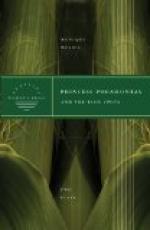There followed more words between the two and much talk of “father” and “son”; but Pocahontas, who listened to it all, was not easy. She had given her affection to Smith since the day she saved his life, and now she was sure that her father planned to harm him. Nautauquas was away with Claw-of-the-Eagle on a foray against the Massawomekes, the latter having sworn to her that he would now accomplish deeds to make the chiefs of his tribe declare him worthy to be called a real Powhatan brave. Had her brother been at Werowocomoco, she might have confided her fear to him; as it was, she realized that she alone must discover her father’s intentions.
She saw that Powhatan had withdrawn on some pretext she did not overhear and that Smith, standing at the entrance of the lodge which Powhatan had assigned to the English, was chatting with some of the squaws he remembered from the time of his captivity, while the rest of the white men were busy in carrying the objects they had brought for bartering from the boat to the lodge.
Suddenly a number of Indian braves rushed towards him, arrows notched in the bowstrings. The foremost savage let his arrow fly; it was aimed a few feet too high and, grazing Smith’s steel morion, hit the bark of the lodge-covering above his head. The squaws, shrieking loudly, took to their heels. Smith, before another arrow left its bow, whipped out his pistol and pointed it at the advancing crowd. Then John Russell, hearing the commotion, rushed from the lodge. Pressing the snaphance of his musket, he fired into the oncoming savages, but failed to hit one.
Nevertheless, the Indians, seeing that the Englishmen were still armed, turned and fled, disappearing into the forest. Pocahontas, trembling with anger, ran through the trees to find her father to ask him what was the meaning of this treacherous treatment of his guests.
After she had run some little distance she caught sight of Powhatan approaching and, hiding behind a rock, she waited to see whither he was bound. To her amazement, she saw that he was turning to the strangers’ lodge and that behind him followed slaves bearing great baskets of food and seed-corn. What could he mean, she wondered, by first trying to kill and then to feast the white men? She followed, herself unseen, while Powhatan approached Smith without the slightest hesitation.
“It rejoiceth my heart, my son,” she heard him call out when he was within one hundred feet of where Smith was standing, watching him with puzzled eyes, “to know that thou art unharmed. While I was gone to see that provisions were provided for thee, even according to my word, my young men who were crazed with religious zeal and fasting they have undergone in preparation for a great ceremonial planned by our priests, knew not what they were doing. See, my son, think no evil of us; would we at one moment seek to harm and to help thee? Behold the supplies I, thy father, have here for thee.”




